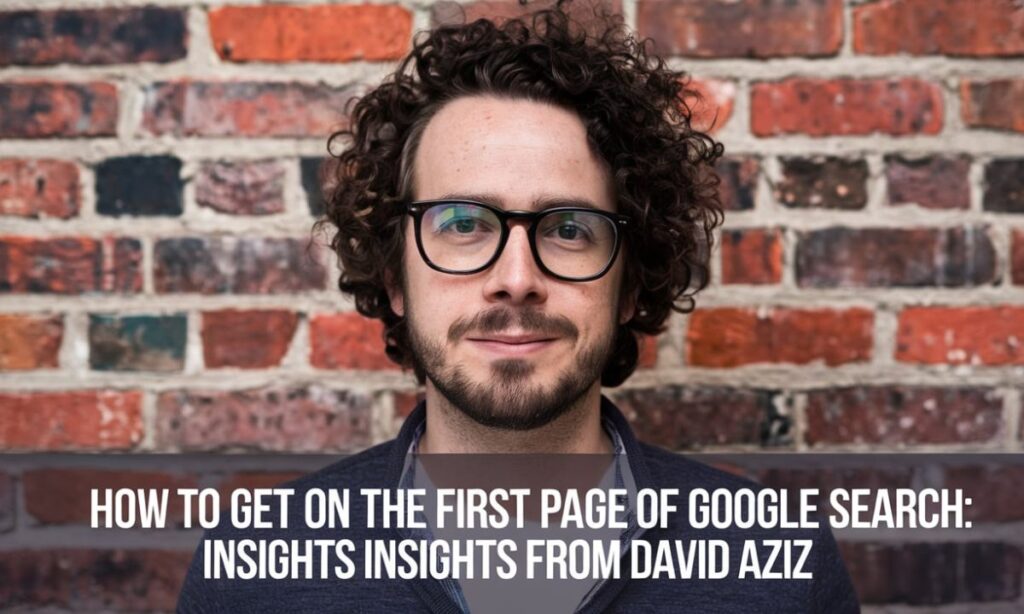Ranking on the first page of Google is every website owner’s dream. David Aziz, a renowned SEO expert, shares actionable strategies and tips to achieve this coveted position.
This guide provides a comprehensive roadmap for optimizing your website effectively and ensuring long-term success.
Understanding Google’s Ranking Algorithm
Google’s Search Engine Algorithm
Google uses a sophisticated algorithm to determine search rankings. It evaluates over 200 factors, including content relevance, backlinks, user experience, and technical SEO.
These factors ensure users receive the most accurate and valuable results for their queries. Staying updated with algorithm changes is crucial to maintaining or improving rankings.
Key Updates to Know in 2024:
- Mobile-First Indexing Importance: Websites are ranked primarily based on their mobile versions.
- Page Experience Updates: Metrics like Core Web Vitals focus on speed, interactivity, and visual stability.
- User Intent Alignment: Content that directly addresses searcher intent is favored.
- AI Integration: Google increasingly uses AI, such as BERT, to understand nuanced search queries.
Insights from David Aziz
David Aziz emphasizes that understanding how Google prioritizes content can make a significant difference.
He suggests focusing on LSI (Latent Semantic Indexing) keywords, which help Google understand content better.
Additionally, staying ahead of algorithm updates by testing and analyzing changes ensures sustained success.
Key Strategies to Rank on the First Page

Quality Content Creation
High-quality content is the backbone of SEO success. Google’s algorithm prioritizes:
- Relevance: Addressing the user’s search intent clearly.
- Depth: Comprehensive coverage of topics to answer all potential questions.
- Engagement: Using visuals, videos, and interactive elements to retain user attention.
Tips for Creating Quality Content:
- Conduct thorough keyword research using tools like Google Keyword Planner and SEMrush.
- Incorporate LSI keywords to cover related subtopics naturally.
- Use storytelling techniques to make content relatable and engaging.
- Update old content regularly to maintain relevance.
Elements of Quality Content
| Element | Description |
| Relevance | Matches user’s intent and queries |
| Depth | Provides comprehensive and detailed insights |
| Engagement | Encourages interaction through visuals and tools |
On-Page SEO Optimization
On-page SEO ensures your website is optimized for search engines and users:
- Title Tags: Use compelling titles with primary keywords.
- Meta Descriptions: Write concise summaries that entice clicks.
- Headings: Structure content with H1, H2, and H3 tags for clarity.
- Internal Linking: Link to other relevant pages on your site to improve navigation and distribute link equity.
- Keyword Placement: Include primary keywords in the first 100 words of content.
Building High-Quality Backlinks
Backlinks are a critical ranking factor:
- Focus on acquiring links from authoritative and relevant websites.
- Use guest posting to showcase expertise on popular blogs.
- Create shareable content like infographics and research studies to attract natural backlinks.
- Monitor your backlink profile using tools like Ahrefs to disavow harmful links.
Effective Backlink Strategies
Read this blog https://moz.com/learn/seo/on-site-seo
| Strategy | Benefit |
| Guest Posting | Builds authority and drives referral traffic |
| Content Collaboration | Enhances credibility and visibility |
| Authoritative Sites | Improves trustworthiness in Google’s eyes |
Technical SEO Factors

Technical SEO ensures your website is accessible and crawlable by search engines:
- Page Speed: Optimize images, use caching, and implement a content delivery network (CDN) to improve load times.
- Mobile-Friendliness: Design your website with responsive layouts to cater to mobile users.
- Site Architecture: Ensure your site is easy to navigate with a clear structure.
- HTTPS Security: Use SSL certificates to secure your website and improve trustworthiness.
- Canonical Tags: Prevent duplicate content issues by using canonical URLs.
Key Technical SEO Factors
| Factor | Importance |
| Page Speed | Enhances user experience and reduces bounce rates |
| Mobile-Friendliness | Essential for mobile-first indexing |
| HTTPS Security | Builds trust and improves ranking |
| Site Architecture | Improves crawlability and user navigation |
| Canonical Tags | Prevents duplicate content issues |
The Role of User Experience in Ranking High on Google
Why User Experience (UX) Matters for SEO
User experience directly impacts metrics like bounce rate, dwell time, and conversions. Google considers these metrics when ranking pages. A seamless and enjoyable experience encourages users to stay longer and interact more with your content.
How David Aziz Enhances User Experience for SEO
David Aziz recommends focusing on the following areas:
- Simplified Navigation: Use intuitive menus and clear call-to-action buttons.
- Page Load Speed: Ensure your site loads in under three seconds to prevent user frustration.
- Reducing Intrusive Ads: Avoid pop-ups and overlays that interrupt the user’s journey.
- Responsive Design: Test your website’s performance on various devices.
User Experience Improvements
| Improvement | SEO Benefit |
| Simplified Navigation | Increases time on site and reduces bounce rates |
| Faster Page Load | Improves overall ranking and user satisfaction |
| No Intrusive Ads | Keeps users engaged without frustration |
| Responsive Design | Enhances compatibility across all devices |
How to Track and Measure SEO Progress for First Page Ranking
Setting Up SEO Goals and KPIs
Define measurable objectives to track your SEO performance:
- Organic Traffic Growth: Monitor monthly visitors from search engines.
- Bounce Rate Reduction: Aim for lower bounce rates to indicate improved engagement.
- Keyword Rankings: Track the position of target keywords in search results.
- Conversion Rates: Measure how many visitors take desired actions on your site.
Using SEO Tools to Monitor Progress
Leverage tools like:
- Google Search Console: Gain insights into site performance and indexing issues.
- SEMrush and Ahrefs: Track keyword rankings, analyze backlinks, and perform competitor analysis.
- Google Analytics: Measure user behavior and conversion rates.
Best Practices for Monitoring SEO:
- Regularly audit your website for technical issues.
- Analyze user behavior to identify content gaps.
- Compare performance metrics against competitors to find areas for improvement.
Additional Strategies for Long-Term Success

Creating Evergreen Content
Evergreen content remains relevant over time and continuously attracts traffic. To create such content:
- Focus on timeless topics that answer persistent questions.
- Use formats like how-to guides, tutorials, and FAQs.
- Update the content regularly to ensure accuracy.
Enhancing Mobile Experience
With mobile-first indexing, your website’s mobile version takes precedence in rankings. To enhance mobile experience:
- Use responsive design.
- Minimize large image sizes for faster loading.
- Test usability on different devices using tools like Google’s Mobile-Friendly Test.
Aligning with User Intent
Understanding user intent is critical for creating content that ranks. Identify whether the user’s query is:
- Informational: Provide detailed answers.
- Navigational: Guide users to a specific page or product.
- Transactional: Offer clear CTAs and a seamless checkout process.
Long-Term SEO Strategies
| Strategy | Benefit |
| Evergreen Content | Consistently drives traffic and rankings |
| Mobile Optimization | Ensures compatibility with mobile-first indexing |
| User Intent Alignment | Improves relevance and user satisfaction |
| Regular Updates | Maintains freshness and competitiveness |
FAQ’s
What are the top Google ranking tips from David Aziz?
Focus on quality content, high-quality backlinks, user experience improvements, and staying updated with algorithm changes.
How does mobile-first indexing affect rankings?
Google prioritizes mobile-friendly websites in its rankings. Ensure your site is optimized for mobile users.
What tools does David Aziz recommend for tracking SEO?
He suggests using Google Search Console, SEMrush, Ahrefs, and Google Analytics for comprehensive tracking and insights.
Why are LSI keywords important?
LSI keywords help Google understand the context of your content, improving its relevance and ranking potential.
How can page speed optimization improve SEO?
Faster page loading times enhance user experience, reduce bounce rates, and positively impact rankings.
Conclusion
Achieving a first-page ranking on Google requires a multi-faceted approach. By following insights from David Aziz—focusing on quality content,
technical SEO, user experience, and continuous monitoring—you can improve your chances of ranking higher Implement strategies like creating evergreen content,
aligning with user intent, and optimizing for mobile-first indexing to stay competitive.
With consistent effort and a focus on providing value
Visit my blog https://techyspirtz.com/
Visit my other website https://verbvictories.online/

David is a seasoned SEO expert with a passion for content writing, keyword research, and web development. He combines technical expertise with creative strategies to deliver exceptional digital solutions.














